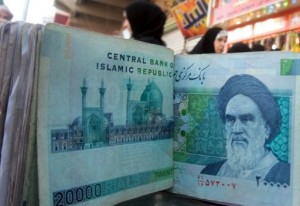 TEHRAN � In a bid to cut spending, the Iranian government has ended a massive cash assistance program and launched a celebrity-driven campaign to convince millions of Iranians that they do not need the help.
TEHRAN � In a bid to cut spending, the Iranian government has ended a massive cash assistance program and launched a celebrity-driven campaign to convince millions of Iranians that they do not need the help.It�s unlikely to be a popular message. As of last month, more than 90�percent of Iranians were receiving monthly direct deposits from the government of about $15 � a sum that many, though certainly not all, depended on to buy staples whose prices have soared in recent years.
The payments were launched in 2010 by then-President Mahmoud Ahmadinejad as part of a program to reduce state subsidies on utilities and food. But they ended up costing the government billions of dollars and, many economists say, contributing to Iran�s skyrocketing inflation rate.
On Friday, the government of President Hassan Rouhani�sent the final payment to Iranians� bank accounts, and it is taking applications to determine how many people really need the help.
To keep that number as low as possible, the government is airing radio and television ads in which professional soccer players and actors say they will not enroll. Most cabinet ministers have urged their staffs not to sign up, and one of the country�s highest-ranking Shiite clerics issued a fatwa Thursday deeming the collection of payments by those who are not poor �religiously problematic.�
Deciding who truly needs the help � and slimming such a massive assistance program in general � will be a key test for Rouhani, who was elected in June largely based on his promise of a brighter economic future for all Iranians. The government has not said what the cutoffs for eligibility will be or when the payments will resume.
Ahmadinejad�s government originally intended to deliver the deposits only to the needy. But analysts say a combination of limited income data and political turmoil after Ahmadinejad�s�disputed 2009 election�led him to view the aid as an opportunity to placate a restless society.
�Given that the government was already unnerved by the 2009 protests, universalizing the cash grant was the path of least resistance for Ahmadinejad,� said Kevan Harris, a Princeton University sociologist who studies Iran�s social welfare system.
For millions of Iranian households, the deposits quickly became an important economic boost during difficult times. The program is now generally accepted as an important first step to wean the public off of overly subsidized utilities, but at a very high cost.
The head of the government agency that oversees the deposits said this week that in the 38 months since the program began, the equivalent of more than $50�billion had been paid to Iranian bank accounts.
But as the government asks the public to help it reduce the payouts, some recipients are calling the message insensitive to the problems of ordinary people.
�My husband is retired, and we rely on the payments to help manage our expenses,� said homemaker Masoumeh Tabrizi, 65. �We must register. I have seen on TV that they are telling people not to take the money, but it seems they do not recognize the situation of people like us.�
Alieh Firoozi, another homemaker, said she had already registered for the payments.
�If the government doesn�t want to give it to us, let them make that decision, but I think they must take special care of families like ours,� Firoozi said. She said her family of five uses the monthly cash infusions to help cover the expenses of a disabled daughter who requires constant care and lives in a state-run hospital.
The�online application process�is also an effort by authorities to collect financial data from a public that has rarely been willing to divulge such information to the state. The government has warned that those who provide false financial data on their applications will be fined three times as much as their previous monthly deposits.
The program changes have coincided with the announcement of utility and gasoline price increases, which are adding to public concerns that this year will be even more economically trying than last year.
�Whenever the price of gasoline goes up, so does the price of bread, and when bread gets more expensive so does everything else,� said Marzieh Dolati, a teacher who said she makes the national average income of about $350 per month. �We�re not stupid. We see what�s happening in front of us.�
Increasing prices and the national currency�s diminished purchasing power have been among Iranians� core complaints for several years. If these problems are not resolved, they threaten to undermine the new government�s popularity.
�These price hikes will create short-term bursts of inflation,� said Harris, the Princeton sociologist. �There's no getting around it. If the government cannot explain the rationale for the policy as it continues, then people will forget about Ahmadinejad, and Rouhani will assume the blame.�
By The Washington Post
The Iran Project is not responsible for the content of quoted articles.










